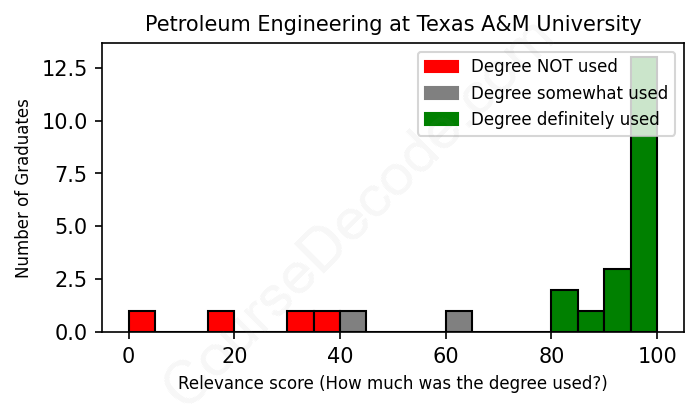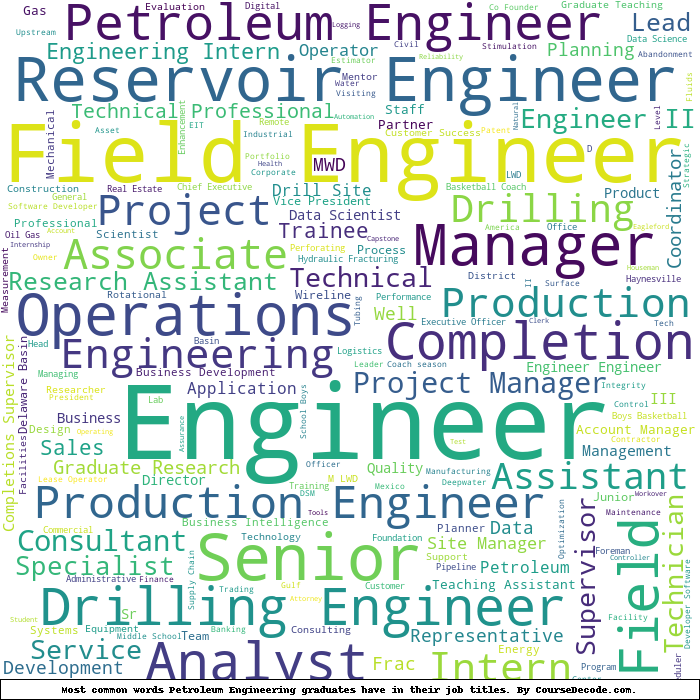
First, some facts. Of the Petroleum Engineering graduates from Texas A&M University we've analyzed , here's how many have used (or NOT used) their degree in their career:

These are estimates based on AI analysis of 25 LinkedIn profiles (see below).
The verdict? Significantly above average. Overall, with an average relevance score of 80%, Petroleum Engineering graduates from Texas A&M University have a much higher likelihood (+13%) of finding work in this field compared to the average graduate across all fields:
And for comparison, here's the chart for all profiles we've looked at across all degrees.
Also, after graduating, only 32% of these graduates have pursued further education other than another Bachelor's degree (such as a Masters degree or other), compared to the average across all profiles of 35%. This suggests a Bachelors degree is enough for most Petroleum Engineering graduates, and it's normal to look for work straight after graduation.
See the details:
|
Relevance score: 63% We think this person has gone into a career only somewhat relevant to their degree. We think this person has gone into a career only somewhat relevant to their degree.
DEGREE INFOGraduated in 2015 from Texas A&M University with a Bachelor's degree in Petroleum Engineering. Also pursued further education since (see below). JOB HISTORY SINCE GRADUATIONDrilling Engineer Energy XXI Jul 2015 - Dec 2018 President | Trader | Analyst  Roller Capital LLC Dec 2018 - Apr 2021 Data Science Fellow  Springboard Apr 2021 - Dec 2021 Data Scientist  Tapp Influencer Marketing Dec 2021 - Mar 2022 Pricing Analyst  FleetPride Mar 2022 - Present FURTHER DEGREES DONE SINCE GRADUATINGUnknown degreeSpringboard 2021 - 2021 Unknown degree Springboard Data Science Career Track, Certification 2021 - 2021 ABOUTI am a Data Scientist and a Data Analyst. I am skilled in Python, SQL and Excel VBA. I have experience with building and tuning predictive models, data visualization, and working with advanced time series analysis models. I've used several AWS cloud computing tools, such as SageMaker and PySpark, to develop machine learning solutions for big data problems. As a Drilling/Petroleum Engineer I used Excel VBA extensively, writing sophisticated programs to automate daily tasks performed daily by Petroleum Engineers. I also gained much experienced in project and time management, budgeting and AFE estimation, supply chain, and well design.In my current role as a Pricing Analyst, I develop various tools to help automate and streamline pricing decisions on millions of skus.Technical Skills:Languages: Python (Pandas, Numpy, Scikit-Learn, PySpark), SQL, Excel VBADatabases: SQL, mySQL, PSQL, SharePoint, WellView, TimeScaleDBMachine Learning: Hypothesis Testing, A/B Testing, Regression, Classification, kNN, Random Forest, K-Means Clustering, Neural Networks, AWS SageMakerData Visualizations: Matplotlib, SpotfireVersion Control: Git, GitHUB, GitLABData Collection: API, CSV, JSONDrafting and Design: AutoCAD, Autodesk Inventor |
The top 10 most common jobs done by the graduates we've analyzed (ranked most common to least) are:
Based on the LinkedIn profiles of individuals who graduated with a Petroleum Engineering degree from Texas A&M University, it seems that the most common job roles they took on after graduation fall primarily within the realm of engineering, particularly as drilling engineers, production engineers, and reservoir engineers. Many of these positions, such as Drilling Engineer at companies like Chevron and Oxy, directly apply the core principles of petroleum engineering, emphasizing skills like drilling operations, reservoir management, and engineering design. Other notable positions include Operations Engineers and Field Engineers, often focusing on optimizing oil and gas production processes. This indicates a strong trend towards roles that are not just related, but also foundationally linked to their educational training in petroleum engineering.
However, there are instances where individuals ventured into jobs that might not directly utilize their petroleum engineering skills. For example, roles like Data Scientists, Customer Success Engineers, and investment banking positions highlight a drift away from core engineering responsibilities, focusing instead on data analysis, customer relations, and financial services. While some of these positions require analytical skills that can be honed in engineering programs, they do not leverage the specialized knowledge of petroleum engineering extensively. Overall, while the majority of graduates remain in roles closely tied to their degree, there's a noticeable trend of shifting towards more diverse job functions in the engineering and business fields that don’t always directly relate to petroleum engineering. Still, the significant presence of engineers in traditional petroleum roles showcases the degree's relevance and application in the industry.
Here is a visual representation of the most common words in job titles for Petroleum Engineering graduates (this is across all Petroleum Engineering graduates we've analyzed, not just those who went to Texas A&M University):

Graduates with a Petroleum Engineering degree from Texas A&M University tend to have a strong career trajectory in the oil and gas industry. Right after graduation, many of them land roles such as drilling engineers, field engineers, or operations engineers at major companies like Chevron, Halliburton, and Anadarko Petroleum. It’s pretty common for them to start in supportive or entry-level positions in the field, which gives them valuable hands-on experience to build on. For instance, many of the graduates from 2010 to 2014 quickly progressed from initial engineering roles to more senior positions like project managers or operations managers within just a few years. This indicates a solid pathway for career growth and development in their respective fields.
Fast forward five to ten years, and the trends continue to look positive. Most graduates remain within the oil and gas sector and often transition into advanced roles like senior engineers, engineering advisors, or even managerial positions. Some have even made entrepreneurial leaps or pivoted into data science roles, showcasing the versatility of their engineering education. Although a few have branched out into completely different areas, like investment banking or tech, it seems that a significant majority stick closely to related fields, which speaks to the strength of a Petroleum Engineering degree. Overall, if you're considering this path, it looks like there are good prospects for building a successful career in this industry!
Honestly, a Bachelor’s degree in Petroleum Engineering is on the tougher side compared to many other majors. At Texas A&M University, which has a solid reputation for engineering programs, you'll dive deep into subjects like thermodynamics, fluid mechanics, and reservoir engineering. The coursework can be pretty challenging, and you'll definitely need to be good at math and physics. Plus, the projects and labs can be demanding, requiring a good amount of teamwork and problem-solving skills. So, if you're up for a challenge and enjoy engineering, it could be a great fit, but just know that it won’t be a walk in the park!
Most commonly, in the LinkedIn profiles we've looked at, it takes people 4 years to finish a Bachelor degree in Petroleum Engineering.
The petroleum engineering graduates from Texas A&M University seem to be doing pretty well financially, especially considering the lucrative nature of the oil and gas industry. Many of them have stepped into solid positions with major companies right out of school, moving up quickly into senior roles like drilling engineers, operations managers, and even vice presidents! The roles they’ve taken on typically come with decent salaries and often opportunities for bonuses, especially in companies like Chevron and Halliburton. Overall, it looks like these grads are on a good financial path, enjoying the benefits of a strong industry that demands skilled engineers. So, if you're considering a future in petroleum engineering, it could lead to a nice paycheck!
Here is a visual representation of the most common words seen in the "about" section of LinkedIn profiles who have a Bachelor degree in Petroleum Engineering (this is across all Petroleum Engineering graduates we've analyzed, not just those who went to Texas A&M University). This may or may not be useful:

Here are all colleges offering a Bachelor degree in Petroleum Engineering (ordered by the average relevance score of their Petroleum Engineering graduates, best to worst) where we have analyzed at least 10 of their graduates:
| College | Score | Count |
|---|---|---|
 Texas A&M University Texas A&M University
|
80 | 25 |
 Louisiana State University Louisiana State University
|
79 | 26 |
 University of Oklahoma University of Oklahoma
|
78 | 20 |
 Texas Tech University Texas Tech University
|
77 | 20 |
 Penn State University Penn State University
|
75 | 11 |
 The University of Texas at Austin The University of Texas at Austin
|
75 | 18 |
 Marietta College Marietta College
|
70 | 20 |
 Colorado School of Mines Colorado School of Mines
|
69 | 30 |
 West Virginia University West Virginia University
|
68 | 10 |
 University of Houston University of Houston
|
67 | 19 |
 University of Louisiana at Lafayette University of Louisiana at Lafayette
|
63 | 10 |